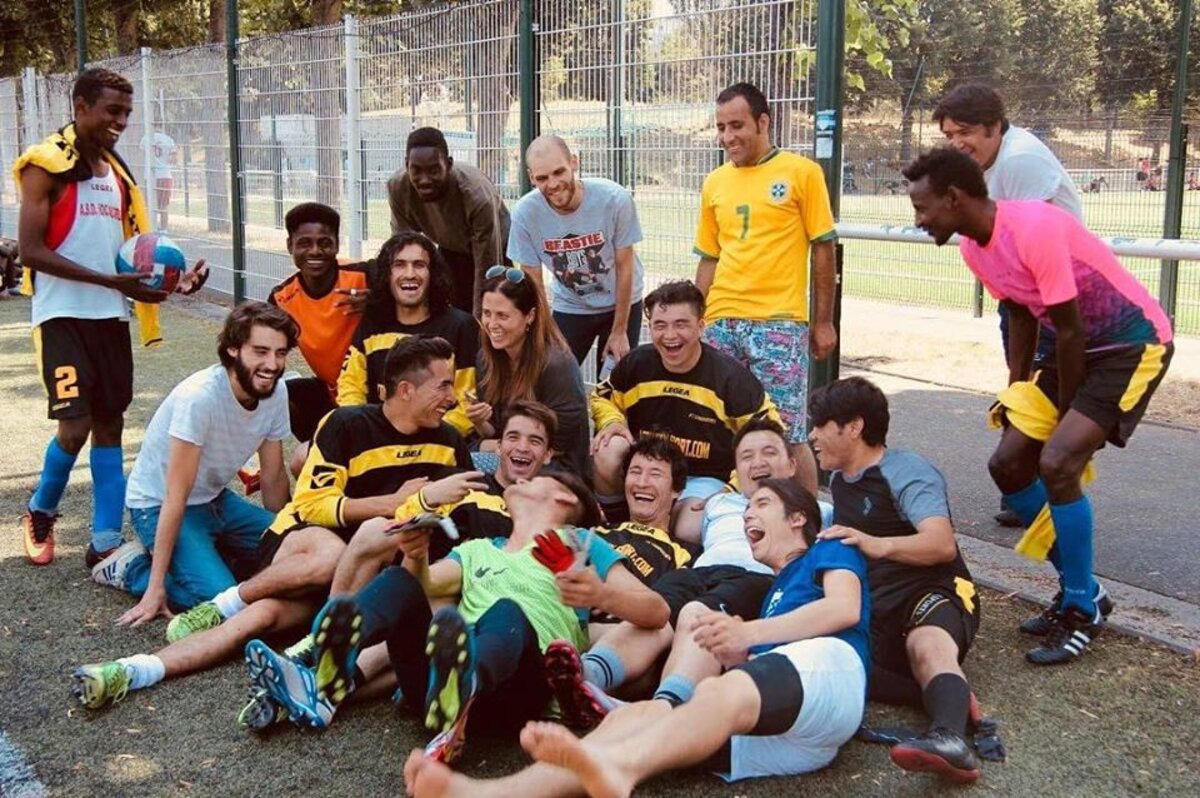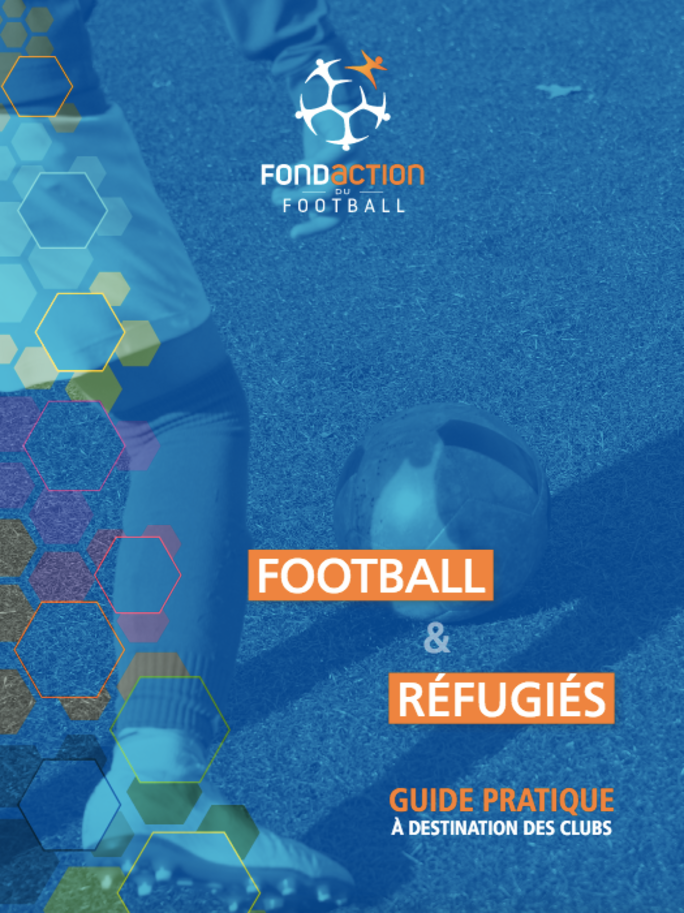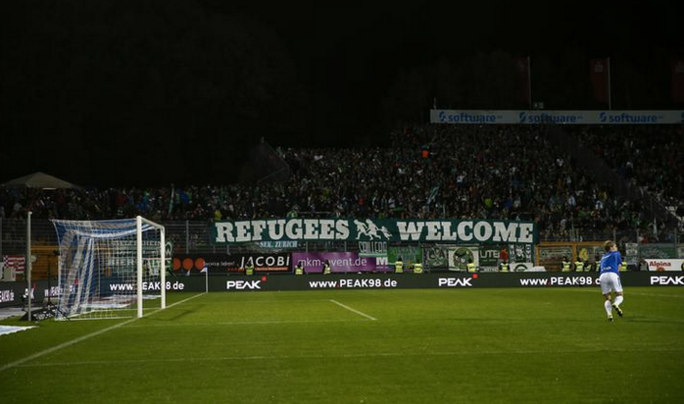It is a dark November evening and a glacial cold has descended on the sports ground at Bobigny, north-east of Paris. Under the pallid glow of the floodlights, a handful of teenagers are rapidly putting on their boots. Despite the worn state of the synthetic pitch, the young players kick the ball with gusto. The little improvised matches are frequently punctuated by laughter and lively debates about supposed fouls.
Since 2019 a group called Équipe sans Frontières ('Team Without Borders') has been training between 30 and 50 young migrants on the Bobigny pitch. Many of the youngsters are unaccompanied minors. One is Afghanistan-born Ahmad, who is 17 - “soon 18” he says with a smile – and who arrived in France in December 2018. “I've been at Équipe sans Frontières for eight months,” says the young player. “I was already playing football in my country. I come each week to have proper training but also because I've made friends here.”

Enlargement : Illustration 1

“I was giving each group of young foreigners French lessons organised by an association, the Bureau d’Accueil et d’Accompagnement des Migrants (BAAM),” explained Chloé Cassabois, president and founder of Équipe sans Frontières . “One day we spoke about football and suddenly even the shyest among them started speaking. They had such passion!” She continued: “Because of having to find a pitch and the fact that they didn't have any equipment, they told me it was very difficult for them to play. So I asked them if they were up for setting up a team.”
The association Équipe sans Frontières was formed in January 2018 after a pitch, footballs and some shorts had been sourced. “We've been in demand constantly ever since, in particular with foreign unaccompanied minors,” said Chloé Cassabois. “To get Aide Sociale à l’Enfance (ASE) [editor's note, welfare help from children's social services] these young people need to prove that they are minors. While this is being investigated they have no status, and without the right documents they can't join a football club.”
The training session is nearly over when Farad hurtles onto the pitch. This 15-year-old Afghan migrant, with a thin face and the frail body of a teenager, hastily pulls on a jersey from the bench on the touchline. “They haven't acknowledged me as a minor,” he says. “In the meantime I've been staying in a Doctors Without Frontiers [editor's note, Médecins Sans Frontières in French] centre. I've been in France for a year and three months. I've even asked them to carry out a bone test to prove I'm a minor but they refused me one.” Before rushing off to join his teammates, the young Real Madrid fan says: “I love coming to train, to improve my football but also to carry on with life.”
Farad is one of the tens of thousands of teenagers who arrive on their own each year on French soil. In 2017, out of the 54,000 foreigners checked to see if they were really minors, only 15,000 of them were accepted as children and supported by the Aide Sociale à l’Enfance (ASE) welfare system. These figures come from a February 15th 2018 report by a cross-party group looking into the issue of unaccompanied minors.
Pierre Rosin, a legal expert and activist at the immigrant support organisation Groupe d’Information et de Soutien des Immigrés (GISTI), regular appears before family court judges to ask for them to be accepted as minors, when they have been turned down by the Red Cross – the body in charge of the evaluation process in Paris. “When we're giving legal advice many tell us about the difficulty in signing up for a football club,” he said. “And for those who are in the middle of an administrative process before a judge it's just impossible.” When someone applies to register as a member, football clubs who are registered with the game's ruling body in France, the Fédération Française de Football (FFF), demand a series of documents from status-less young migrants that are hard to produce. These include a birth certificate and a parent's identity card.
This was why in June 2016 Pierre Rosin and other legal experts from GISTI founded the association Melting Passes, to allow these unaccompanied minors to indulge their passion without having to go via an FFF-affiliated football club. “We started by squatting on a football pitch in the north of Paris, then organised fundraising to buy boots, because some were playing in flip-flops,” Pierre Rosin recalled. “At Melting Passes we welcome lots of kids who are just going round in circles, waiting to go before the family judge. For example, the team captain spent nine months like that. Others were even sleeping in the metro.”
Following on from Équipe sans Frontières and Melting Passes, other groups have sprung up in the Paris region aimed at helping unaccompanied foreign minors, such as Paris d'Exil FC and FC Phénix from Versailles. These teams, whose players have not been able to register with FFF clubs, take part instead in the league run by the Fédération Sportive et Gymnique du Travail (FSGT), an all-sports educational federation set up in 1934.
“The FSGT has given us a good welcome and has sorted out the players' documents,” said Chloé Cassabois from Équipe sans Frontières. “Taking part in a league is way of helping the youngsters to be sociable, to practice their French, to see other places. During matches and away trips we are often all together: we laugh a lot and we sometimes argue, like a real family. That enables the youngsters to be involved in something new and more positive,” she said. Pierre Rosin added: “For many of them playing football allows them to think about something other than their exhausting administrative procedures. And as they were already playing football in their country of origin, it gives them an anchor point. That's important when you still don't know the rules of behaviour in France.”
Lack of concern from French football authorities
In regional France some football clubs affiliated to the FFF are nonetheless doing their best to cater for unaccompanied foreign minors. At Guipavas, in the suburbs of Brest in Western France, for example, the club AL Coataudon holds training sessions twice a week for migrants who are still waiting for a decision on whether they are to be accepted as minors or not. According to the federation's own rules, FFF clubs can welcome unregistered footballers but only for training sessions. “In March 2017 I had come to give some clothes to an association as part of a collection for migrants in Calais,” recalled Luc Tréguier, AL Coataudon's president. “I was wearing my club's tracksuit and a woman asked me whether I wanted to organise a little match for foreign minors that she was involved with.”
Three months later the club signed an agreement with the départemental or county social action centre in Brest and with local associations. Last season this small club from the Brittany region provided football for around a hundred young unaccompanied migrants, mainly from Guinea, Mali and the Ivory Coast, giving them a chance to indulge their passion for the sport.
In Haute Savoie, a département or county in the French Alps, the club ES Saint-Jeoire La Tour has taken in around fifteen unaccompanied minors each year since 2003. The club's pitch is located around one hundred metres from the départemental or county centre for unaccompanied foreign minors. “The link was made naturally: the youngsters were hanging around the centre and they wanted to kick a ball,” recalled Arnaud Staropoli, the club's president. “Football is a universal language, it's a good way to integrate locally and an important social support when you have neither family or access to education.”

Enlargement : Illustration 2

Along with Luc Tréguier, AL Coataudon's president, and other amateur clubs Arnaud Staropoli took part in drawing up a practical guide called Football & Réfugiés, published by France's football foundation the Fondaction du Football and distributed in October 2019 to all clubs (see right). “But to be honest the FFF aren't helping us with this at all,” said the ES Saint-Jeoire La Tour club's president. “The players can't take part in competitions because they don't have a licence. And if a young player who's not registered is injured during training it's the club president who is responsible,” said Arnaud Staropoli. “I hope they are going to become aware of the reality because welcoming in foreign unaccompanied migrants has become a real issue for amateur football in the last four years.”
At the heart of the problem is circular 1190 from the world governing body the International Federation of Association Football or FIFA. This was issued in 2009 and its aim was to combat the trafficking of young footballers in countries where children's rights are not respected. But the interpretation given to it by France's FFF was to lump together registrations requests from unaccompanied minors to a club with the international transfers of young foreign players. In demanding a series of administrative documents from children on the pretext of protecting them from football trafficking the FFF in effect refused to allow registration for any foreign child who wanted to play football for a club.
Under pressure from the human rights group the Ligue des Droits de l’Homme (LDH), who in 2010 pointed out the absurdity of the situation with regard to human rights, the FFF relaxed its rules from 2013. Indeed, other circulars from FIFA have made it easier for foreign minors to get registered with clubs. “For an unaccompanied foreign minor who receives Aide Sociale à l’Enfance, we now ask for a document from the département [editor's note, county] proving that they are looking after the minor and an official document proving their identity and date of birth,” said Pierre Samsonoff from the Ligue du Football Amateur (LFA), which comes under the umbrella of the FFF. “For a minor awaiting a decision it's still impossible for us to register them while we have no proof of their identity or their date of birth.”
The Ligue des Droits de l’Homme (LDH) considers that the documentary proof demanded by the sports federation runs contrary to the International Convention on the Rights of the Child. “The FFF thinks that its power and status allows it to implement its own law,” said Pierre Tartakowsky, president of the LDH and rapporteur for the views of the consultative body the Nationale Consultative des Droits de l'Homme on racism in sport. “But it is establishing a double punishment for foreign minors: it's discriminating between French children and foreign children who are not put on the same equal footing, as well as imposing a barrier against the exercise of a fundamental right, education via sport.”

Enlargement : Illustration 3

In Germany, meanwhile, a very different approach has been adopted. In 2015, the year that Germany took in close to a million refugees, the German football association the Deutscher Fußball-Bund (DFB) granted 42,000 licences to foreigners, many of them unaccompanied minors.
Later the DFB published a brochure aimed at migrants and football clubs which contained a great deal of practical, legal and psychological advice. The DFB's programme – called “1-0 für ein Wilkommen” or “1-0 to the Welcome”- provides for a 500 euro payment to any club that gives free registration, shorts and German lessons to refugees.
Since March 2015 some 3,600 German football clubs have become involved in welcoming migrants. “More than 20% of DFB members are originally immigrants,” the former German international of Brazilian origin Cacau said on August 5th 2019. Cacau, who has become a representative for the DFB migrant programme, noted: “Today more than 80,000 refugees are playing football in the country's amateur leagues.”
Some unaccompanied foreign minors have even gone on to become professional players, such as Bakery Jatta who fled Gambia at the age of 17 and crossed the Mediterranean Sea in 2015. A year after his arrival in Germany he was recruited by top-flight club Hamburg SV. “Football has enabled me to learn the language, to meet Germans and to escape the boredom of being cooped up at home,” the midfielder said back in 2016.
The big professional clubs have also played their part. In August 2015 Borussia Dortmund invited 200 refugees to attend a Europa League match free of charge. Bayern Munich has allowed teams of young migrants to use its training grounds. And the German second division club, FC St Pauli, who are based in Hamburg and are known for their social engagement, has created a special dedicated section for refugees, which is essentially made up of unaccompanied minors between 15 and 18, and which is called FC Lampedusa, after the Italian island used by many migrants as an early entry point to Europe. “Football is played across the world and the rules are the same everywhere,” said Cacau. “In a football club no one pays attention to where you come from. That's why football is a very good method of integration for people who arrive in our country.”

Enlargement : Illustration 4

Thomas Farines has worked for six years using football as a means of welcoming and integrating young migrants, in Britain, France and currently Greece, working as a sports consultant for Swiss children's charity Terre des Hommes-Aide à l'Enfance. For the last three years he has been organising training sessions and matches at Thessalonica for youngsters aged 15 and above, in a country where unaccompanied minors make up 40% of the migrants who arrive by sea, according to a recent World Migration report.
“For many involved in social work, in recent years football has become a powerful tool to deliver to unaccompanied foreign minors some normality in a chaotic daily life, to provide social integration and also help with the psychological well-being of the youngsters by helping them rediscover the idea of fun,” said Farines. He added: “The federations in Germany, Italy and England really get this, but the FFF has clearly never been favourable to welcoming young migrants via football.”
Back in France the limitations of the support give are clear. Last season the management of the Ligue du Football Amateur (LFA) generously gave AL Coataudon club a donation of 60 shirts, shorts and pairs of boots, as well as 25 footballs. But the LFA's and FFF's Pierre Samsonoff admitted: “We don't have a specific policy for welcoming unaccompanied foreign minors. We are helping to restructure amateur clubs, that is our priority.”
Pierre Tartakowsky of the LDH said: “We're up against a brick wall and it's completely incomprehensible from their point of view, because there is no financial cost for the FFF in welcoming foreign minors into clubs.” He added: “The federation's policy is 'We don't want migrants joining us, end of'. That is in essence a good definition of racism: something akin to the irrational.”
-------------------------
If you have information of public interest you would like to pass on to Mediapart for investigation you can contact us at this email address: enquete@mediapart.fr. If you wish to send us documents for our scrutiny via our highly secure platform please go to https://www.frenchleaks.fr/ which is presented in both English and French.
-------------------------
The French version of this article can be found here.
English version by Michael Streeter


